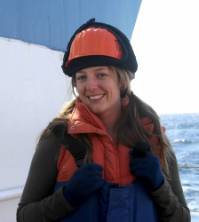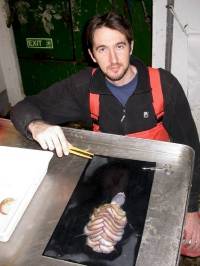What do you study?
I am studying for a PhD at the University of Southampton, based at the National Oceanography Centre, but I work with colleagues at the Natural History Museum. I use video footage taken by a remotely-operated vehicle (ROV) to study animals that live at hydrothermal vents.
What are you most excited about seeing/finding on the trip?
Taking REX into the Blue Hole. Who knows what we will find 200m down…
Where have you been previously on field work?
I have worked in the North Sea, English Channel and the Antarctic, so I am looking forward to working somewhere hot for a change!
What is your best experience whilst on field work?
Being one of the first people to see the hydrothermal vents in the Antarctic. They're not easy to find, but we managed to discover two new vent fields. This new discovery yielded several new species to science, including the much talked about 'Hoff crab'.
Is anything worrying you about the trip?
Working with electronics and water is always a risky business! Let’s hope everything is plugged in and water-tight!
What advice would you give to someone going on field work for the first time?
Take your favourite tea bags and your own mug!
-----------------------
That's it for today - tomorrow we'll meet the rest of the team.




